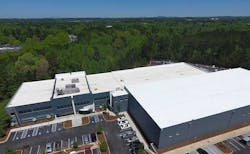Flexential Expands With New Data Center in Atlanta’s ‘Transaction Alley’
Atlanta has been the focus of a lot of buzz about its potential as a hyperscale data center market, prompting several of the industry’s largest players to announce ambitious new projects. When Flexential looks at the Atlanta market, it sees dollar signs – in the form of e-commerce transactions flowing through the region’s data centers.
Financial services is a target market for Flexential as it adds capacity in Atlanta in the latest phase of a broader expansion of its national footprint. The company has just opened a 70,000 square foot data center on its campus in Alpharetta, a northern suburb of Atlanta. The two-story building provides Flexential more than 175,000 square feet of space in Atlanta, where the company als9o has a smaller facility in Norcross. It boosts Flexential’s national colocation footprint to more than 3.1 million square feet.
The expansion is focused squarely on customers in the financial technology (FinTech) field. With more than 120 FinTech firms, Atlanta and the surrounding “Transaction Alley” are the third-largest FinTech hub in the U.S., with more than 70 percent of all credit card transactions now processed through the Atlanta metropolitan area, according to the Atlanta Small Business Network.
The industry is a significant driver of economic growth in Atlanta, employing 37,000 people in the region. One of Flexential’s financial services customers is Delta Community Credit Union, uses the Alpharetta campus to serve its nearly 400,000 members.
“As Georgia’s largest credit union, we gain tremendous confidence and benefits through the geographical placement of Flexential’s connected data centers, which deliver the highest level of security and reliable service for our members,” Chad Jaenke, Vice President, IT Operations and Technical Support, Delta Community Credit Union said. “Every person we work with at Flexential is knowledgeable, responsive, and genuinely cares about the success of our business.”
Building for a Future With LOTS More Data
Flexential is among the data center developers building platforms to help companies manage the growth of their IT services as the business world is reshaped by digital technologies. A recent IDC study predicted that the worldwide data storage will balloon to 175 zettabytes by 2025. What does that number even mean? IDC Senior Vice President David Reinsel says that, if stored on Blu-ray discs stacked atop one another, 175 zettabytes of data would reach the moon and back 23 times.
“Companies are experiencing a data tsunami, with an increased need to store, process and access data securely, efficiently and strategically,” said Mike Fuhrman Chief Product Officer, Flexential. “Atlanta is a perfect example of a market with exponentially growing demand for secure, enterprise-grade and resilient data management solutions. Expanding our facilities footprint and interconnectivity in vital metropolitan areas is a key component of our growth strategy.”
Flexential was formed through the 2017 merger of Peak 10 and ViaWest to create a national network, and is backed by private equity firm GI Partners, an experienced investor in the data center industry. Peak 10 targeted second-tier markets in the Southeast, while ViaWest built a similar network in the Western U.S. The merger of the two firms created a national footprint of 41 data centers in 21 cities, with about 95 megawatts of commissioned power. The company has 4,200 customers, who account for about 65 percent of Flexential’s annual leasing.
The company rebranded as Flexential in early 2018. The name is intended to suggest several qualities embodied by the combined company, including flexible, essential and exceptional. Its slogan is “The power of people in a technical world.”
“Flexential may be a relatively new brand, but ViaWest and Peak 10 were known in these markets for many years,” said Chris Downie, President and CEO of Flexential. “People in the industry know us. We’re really on the back side of our integration, and have been able to maintain our capacity expansion projects throughout to support our customer growth.”
That includes the new Atlanta data center, one of several expansion projects across the company’s portfolio. Flexential also has new capacity coming online in Charlotte, Nashville and Portland, Oregon.
The company’s decision to invest in larger data centers supports a strategic shift into the market for wholesale data center space, in which a tenant leases a finished suite of “turn-key” raised-floor space. Those tend to be larger deals than seen in retail colocation, Flexential’s historic focus, in which tenants buy smaller amounts of space by the cabinet or cage.
“We’ve been in Atlanta for 15 years,” said Downie. “It’s one of the lowest cost markets, so we’re pretty excited about the opportunity. It’s been a strong retail market for us, but in the past, we haven’t been able to go after larger requirements. The new footprint can meet multi-megawatt requirements.”
More Data Centers to Come in Atlanta
Atlanta has emerged as a closely-watched destination for data centers in the wake of last year’s announcement that Facebook will build a $750 million data center in Newton County adds some hyperscale heat to the rising profile of the Atlanta region, which is already seeing new projects from providers targeting the enterprise market, as well as a healthy stream of sale-leaseback transactions.
Colocation provider Switch has announced plans to invest $2.5 billion to build more than 1 million square feet of data center space in Douglas County. Switch says it expects to complete its first phase and offer data center space before the end of 2019. Meanwhile, wholesale specialist Cyrus One is building a 44-acre campus in the Atlanta suburb of Douglasville, that will house 440,000 square feet of data center space. Atlanta-area incumbents QTS Data Centers, Digital Realty and DataBank are also active in Atlanta, while American Tower just entered the market with its acquisition of Colo ATL.
About the Author



